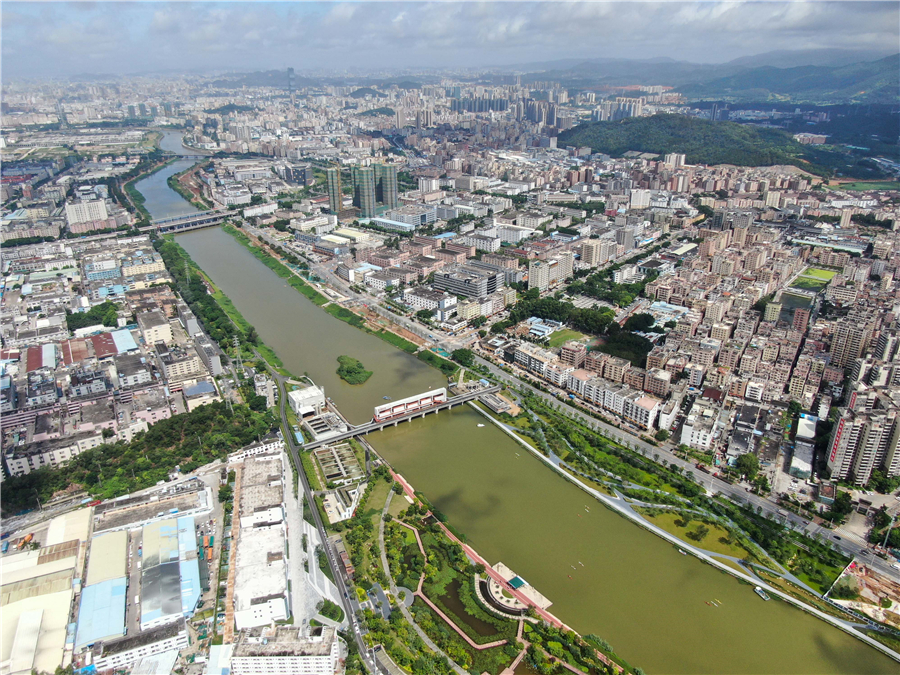99 years on, CPC leads China's evolution on world economic stage

Aerial photo taken on June 15, 2020 shows the view of Maozhou River in Shenzhen, south China's Guangdong Province. (Xinhua/Deng Hua)
Turning 99 this week, the Communist Party of China (CPC) has much to be proud of. The largest political party in the world has transformed a weak, war-torn nation into an economy with one of the fastest growth rates in recent decades.
Yet for the rest of the world, the CPC has offered more than economic miracles and growth locomotives.
Under the CPC's leadership, and moving ever closer to the world's center stage, China has evolved from a follower and learner into a champion and contributor of multilateralism and globalization, one that is always willing to share ideas and solutions to address common concerns, especially in times of pandemic and recession.
AN INSPIRING DEVELOPMENT PATH
This year also marks China's final push in completing the building of a moderately prosperous society in all respects and winning the battle against poverty, despite the social and economic impact of the COVID-19 epidemic.
In 2019, China's GDP per capita exceeded 10,000 U.S. dollars for the first time in history. It was a new milestone in the country's decades of economic catching-up, which proves that a developing country is capable of climbing the ladder of development through structural reform, opening up and technological advancement.
"Socialism with Chinese characteristics has expanded the modernization path for backward countries," said Song Tao, head of the International Department of the CPC Central Committee.
An increasing number of political parties have expressed hopes of enhancing exchange and cooperation with the CPC on state governance, according to Song.
Amid the fallout from the COVID-19 outbreak, China has strengthened cooperation with other countries, especially in the developing world, to fight the global pandemic.
China's development experience over the past decades offers key lessons to Africa, according to UN Deputy Secretary-General Amina Mohammed, who said in February that "China's remarkable achievements in lifting its people out of poverty contributed to major advances under the Millennium Development Goals."
With the aim of eliminating absolute poverty this year, China saw the number of impoverished people fall to 5.51 million at the end of 2019 from 98.99 million at the end of 2012.
FIRMLY SUPPORTING AN OPEN ECONOMY
One principle enshrined in the Constitution of the CPC is that a continued commitment to reform and opening up is the path to a stronger China.
Since 1978, China has been promoting opening up as a fundamental state policy, following the trend of globalization.
From 1978 to 2018, China attracted more than 2 trillion U.S. dollars in non-financial foreign investment, and its foreign trade amounted to 52.2 trillion dollars. In 2018, China's overseas investment reached 143 billion dollars, 53 times as much as in 2002.
According to the report delivered at the 19th National Congress of the CPC, to make new ground in pursuing opening-up on all fronts, China will not close its door to the world, but will instead become increasingly open.
"While protectionism is on the rise and globalization is under vicious assault in some countries, the CPC still keeps its strategic momentum and acts as an anchor for China to bolster wider opening-up, as always," said Wang Wen, executive dean of the Chongyang Institute for Financial Studies at Renmin University, in an interview with Xinhua.
To fulfill its commitment, China has unveiled new, shortened negative lists for foreign investment, and to date, the number of sectors that are off-limits for foreign investors has been slashed to 33 from 93 in 2017.

Customers purchase electronic goods at a duty-free store of a shopping mall in Haikou, south China's Hainan Province, July 1, 2020. (Xinhua/Guo Cheng)
The country has also announced that it will transform its island province of Hainan into a globally-influential high-level free-trade port focusing on trade and investment liberalization and facilitation by the middle of the century.
It is for sure that China will contribute to a stable world economy by continuing to advance reform and opening-up, widen market access, improve the business environment and expand imports and outbound investment.
"At this critical juncture, when the COVID-19 pandemic is still ravaging the globe and brings shocks to the global economy, China does not waver in its determination to further open up," said Ren Lin, a research fellow with the Chinese Academy of Social Sciences.
A COMMUNITY WITH A SHARED FUTURE
Facing a world with growing anti-globalization sentiment, populism, unilateralism and protectionism, the CPC has come up with its own vision of global governance.
The notion of "a community with a shared future for humanity," which pursues an open, inclusive, clean, and beautiful world that enjoys lasting peace, universal security and common prosperity, has gained worldwide recognition.
China, together with many countries, is working to transform this concept into reality.
A total of 138 countries and 30 international organizations have signed cooperation agreements with China on the Belt and Road Initiative (BRI), which aims to achieve policy, infrastructure, trade, financial and people-to-people connectivity along and beyond the ancient Silk Road trade routes.
A World Bank report estimated in 2019 that, if fully implemented, BRI transport projects could increase global real income by up to 2.9 percent and help lift 32 million people out of moderate poverty.
Meanwhile, the China-proposed Asian Infrastructure Investment Bank (AIIB), which has grown to 102 approved members worldwide, has a mission to improve social and economic outcomes in Asia.
The bank has also played an active role in global COVID-19 containment efforts by providing billions of dollars of loans for virus-hit countries.
"By proposing public goods like the BRI and AIIB, among many others, China has shared its development dividends in real terms with the world and let other countries hitch a ride," Wang Wen of Renmin University told Xinhua.
Martin Jacques, a senior fellow of politics and international studies at Cambridge University, said China has done unprecedented pioneering work and offered "a new possibility" to the world.
Editor: John Li